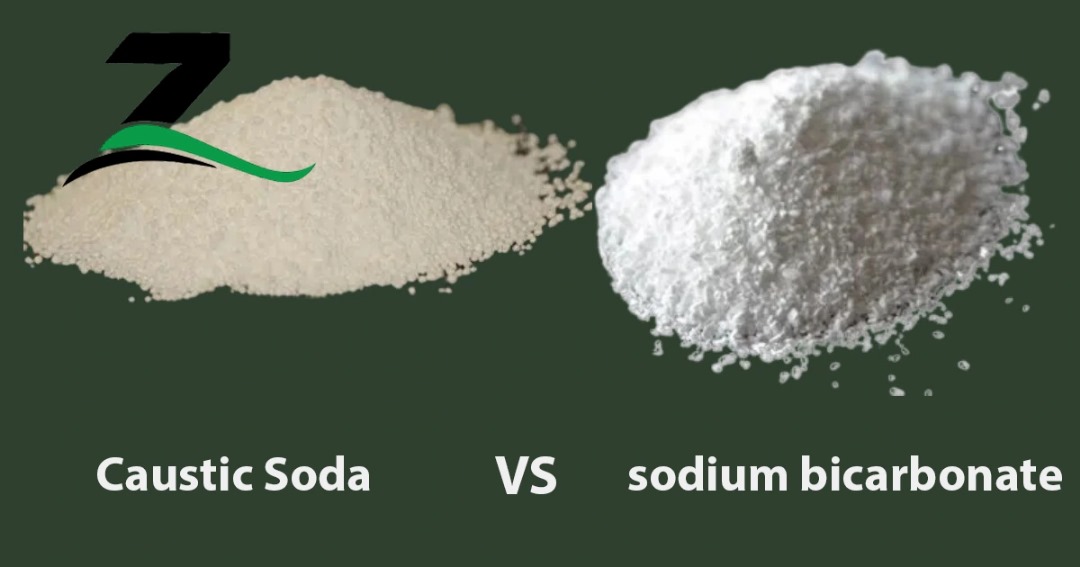Difference Between Caustic Soda and Baking Soda(Sodium Bicarbonate)

Introduction
Caustic soda and baking soda are two very different chemical substances that perform very different functions. Though the names sound similar, their properties, chemical structure, and uses are entirely different. Whether it’s an industrial process or fulfilling household needs, the differentiation between caustic soda and baking soda becomes quite important in terms of safety and efficiency. This article will present a comprehensive comparison to make it clear what sets them apart regarding their unique characteristics, applications, and safety requirements.
What is Caustic Soda?
Caustic soda, scientifically referred to as sodium hydroxide (NaOH), is one of the strongest alkaline substances. It is an extremely reactive chemical with corrosive properties; hence, it finds an essential place in a number of industrial processes. At room temperature, caustic soda is usually white and may be in a flake, pellet, or solution form.
Properties of Caustic Soda
- Chemical Formula: NaOH
- Nature: Strong alkali, highly corrosive
- Appearance: Solid flakes or pellets, sometimes in liquid form
- Solubility: Fully soluble in water, producing significant heat
Applications of Caustic Soda
Caustic soda is widely used in industrial sectors due to its powerful chemical properties. Its primary applications include:
- Chemical Manufacturing: A key component in the production of soaps, detergents, and various chemicals.
- Pulp and Paper Industry: Essential for breaking down wood pulp to create paper.
- Water Treatment: Helps neutralize acidic waste and remove heavy metals from water.
- Petroleum Refining: Used in the desulfurization process to refine crude oil.
- Textile Industry: Aids in the mercerization of cotton, enhancing fabric strength and dye absorption.
What is Baking Soda?
It is much milder than caustic soda, an alkaline compound. Baking soda, or sodium bicarbonate (NaHCO₃), is non-toxic, environmentally friendly, and safe for use with both humans and animals. Baking soda usually appears as a white, fine powder and is a common household product found in almost every home around the world.
Properties of Baking Soda
- Chemical Formula: NaHCO₃
- Nature: Mild alkali, non-corrosive
- Appearance: Fine, crystalline powder
- Solubility: Soluble in water, creating a slightly alkaline solution
Applications of Baking Soda
Baking soda has versatile applications across various domains, including:
- Culinary Uses: Baking soda is a leavening agent that releases carbon dioxide when combined with an acid, helping dough and batter rise.
- Cleaning Agent: Its mild abrasiveness and deodorizing properties make it ideal for cleaning surfaces and neutralizing odors.
- Health and Hygiene: Used as an antacid to relieve heartburn and as an ingredient in toothpaste to clean and whiten teeth.
- Environmental Uses: Helps neutralize acidic spills and serves as a safe cleaning alternative.
- Other Uses: Baking soda is also used in personal care products like deodorants and skincare items.
Key Differences Between Caustic Soda and Baking Soda
| Aspect | Caustic Soda (Sodium Hydroxide) | Baking Soda (Sodium Bicarbonate) |
|---|---|---|
| Chemical Formula | NaOH | NaHCO₃ |
| Nature | Strong alkali, highly corrosive | Mild alkali, non-toxic |
| Primary Applications | Industrial purposes | Household and food-related uses |
| Safety Requirements | Requires protective handling | Safe for direct contact and ingestion |
| Solubility | Produces heat when dissolved in water | Dissolves without releasing heat |
| Environmental Impact | Can harm ecosystems if improperly used | Environmentally safe |
Applications in Industry and Daily Life
Industrial Use of Caustic Soda
- Caustic soda has critical uses in industries requiring strong alkaline properties. It is essential in the production of aluminum by the Bayer process, where it extracts alumina from bauxite ore. It is also used to dissolve organic matter and thus is used in cleaning drains and in sewage treatment.
Household Use of Baking Soda
On the other hand, baking soda has very domestic uses. It is used to clean stubborn stains and grease; it is very effective. In baking also, it is used for improving the texture and making baked items spongy.
Which One Should You Use?
The choice between caustic soda and baking soda depends entirely on your needs:
- For industrial or heavy-duty applications, caustic soda is the appropriate choice due to its strong reactivity.
- For household, culinary, or personal care uses, baking soda is safer and more suitable.
Understanding their differences ensures the correct selection, avoiding potential hazards.
Conclusion
In a nutshell, caustic soda, or sodium hydroxide, and baking soda, or sodium bicarbonate, sound similar but differ in properties and applications. While caustic soda is an industrial powerhouse, baking soda is a household jack-of-all-trades that is safe to use. Distinguishing the two makes all the difference in safe and effective usage in industrial or everyday applications.

